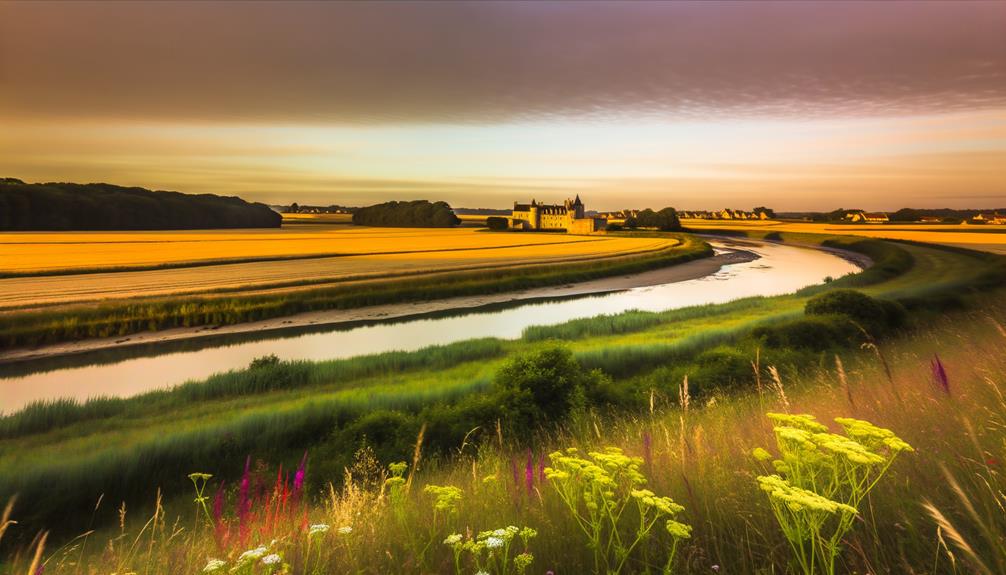Meaning of the Name Lorraine
The name Lorraine, deriving from the medieval Latin term 'Lotharingia,' reflects a nexus of linguistic changes influenced by Latin and Old High German. It originates from the name of King Lothair II, merged with the suffix '-ingia.' Historically, Lorraine stands as a significant political region shaped by the Treaty of Verdun (843) and later European conflicts.
Culturally, it bridges Germanic and Latin traditions, embodying resilience and elegance. This name, emblematic in literature and media, maintains modern adaptability through variations like Lorena and Lora.
Explore more to uncover its profound historical and cultural impact.

Key Takeaways
- Lorraine originates from the medieval Latin term 'Lotharingia', related to King Lothair II.
- The name reflects historical and linguistic evolution influenced by Latin and Old High German.
- Lorraine symbolizes a significant political entity, notably shaped by treaties and wars.
- The name embodies a blend of Germanic and Latin cultural traditions.
- Lorraine is appreciated for its melodic quality and historical significance as a baby name.
Etymology of Lorraine
The name Lorraine originates from the medieval Latin term 'Lotharingia,' which was used to describe the region ruled by King Lothair II in the 9th century. This term itself is derived from Lothair's name, combined with the Germanic suffix '-ingia,' denoting 'land of.'
As a toponym, Lorraine encompasses the historical and linguistic evolution of a territory that was once a significant political entity. The transformation from 'Lotharingia' to Lorraine reflects phonological changes over centuries, influenced by both Latin and Old High German.
The linguistic journey of the name underscores the region's complex socio-political landscape, as well as its enduring legacy within the broader context of European history. This etymological evolution highlights the interplay between language, culture, and geography.
Historical Significance
Renowned for its pivotal role in European geopolitics, Lorraine has been a crossroads of cultural and military significance for centuries. Historically, Lorraine's strategic location between France and Germany has made it a focal point of numerous conflicts and treaties.
The region's importance can be summarized through key historical milestones:
- Treaty of Verdun (843): Divided the Carolingian Empire, establishing Lorraine as a central entity.
- Franco-Prussian War (1870-1871): Resulted in the annexation of Lorraine by the German Empire.
- World War I & II: Lorraine was a significant battleground, influencing its post-war borders.
- European Union Formation: Lorraine's integration into modern France and Germany symbolizes reconciliation and unity within Europe.
These milestones underscore Lorraine's enduring geopolitical relevance.
Lorraine in French Culture
In French culture, the name Lorraine carries significant historical weight, reflecting its origins from the medieval region of Lotharingia.
The region's influence is evident in its contributions to French art, cuisine, and architecture, symbolizing a unique blend of Germanic and Latin traditions.
Additionally, Lorraine's emblematic symbols, such as the Lorraine cross, underscore its enduring cultural and regional identity within France.
Historical Significance
Historically, Lorraine has been a vital region in French culture, known for its strategic importance and rich cultural heritage. Nestled between France and Germany, Lorraine has witnessed numerous historical events that have shaped both its cultural and political landscape. Its significance can be understood through several key aspects:
- Medieval Power Struggles: Lorraine was central in the power dynamics between the Holy Roman Empire and France.
- Renaissance Influence: The region became a hub for artistic and intellectual movements during the Renaissance.
- Franco-Prussian War: Lorraine's annexation by Germany post-1871 profoundly impacted French national identity.
- World War Battlegrounds: Lorraine played a critical role in both World Wars, serving as a strategic military zone.
These elements underscore Lorraine's enduring historical significance.
Regional Influence
Lorraine's regional influence in French culture is palpable through its contributions to cuisine, dialect, and traditional festivals. The region's culinary heritage includes the famous Quiche Lorraine and Mirabelle plums, which are integral to its identity. Linguistically, Lorraine hosts a unique Franco-Germanic dialect, reflecting its historical oscillation between French and German control. Traditional festivals like the Saint Nicolas parade in Nancy highlight the region's rich cultural tapestry.
| Aspect | Contribution | Example |
|---|---|---|
| Cuisine | Signature Dishes | Quiche Lorraine, Mirabelle plums |
| Dialect | Linguistic Blend | Franco-Germanic Dialect |
| Traditional Festivals | Cultural Celebrations | Saint Nicolas Parade |
This synthesis of culinary, linguistic, and festive elements underscores Lorraine's enduring imprint on French cultural identity.
Cultural Symbols
The region's multifaceted identity is further encapsulated through its emblematic cultural symbols, such as the Cross of Lorraine and the Lorrainese thistle, which hold significant historical and cultural resonance in French society. These symbols serve as intricate emblems of Lorraine's legacy:
- Cross of Lorraine: Originating from the Crusades, this cross became a symbol of French resistance during World War II.
- Lorrainese Thistle: This hardy plant symbolizes resilience and fortitude.
- Joan of Arc: Hailing from Domrémy in Lorraine, she epitomizes nationalistic fervor and heroism.
- Quiche Lorraine: This culinary delight is a reflection of the region's gastronomic heritage.
Each symbol integrates historical context and linguistic heritage, reinforcing Lorraine's enduring cultural significance.
Famous People Named Lorraine
The name Lorraine has been borne by numerous notable individuals, contributing to its recognition and cultural significance.
Hollywood actresses such as Lorraine Bracco have illuminated the entertainment industry, while historical figures named Lorraine have made impactful contributions in various fields.
This section will explore the influence and legacy of these prominent personalities who share the name Lorraine.
Hollywood Actresses Named Lorraine
Among the notable figures in Hollywood bearing the name Lorraine, several actresses have made significant contributions to the film and television industry. Their careers exemplify the versatility and talent associated with this name.
Here are four prominent actresses named Lorraine:
- Lorraine Bracco: Known for her roles in 'Goodfellas' and 'The Sopranos,' Bracco's performances have earned critical acclaim and awards.
- Lorraine Toussaint: Her powerful portrayals in 'Orange Is the New Black' and 'Any Day Now' have cemented her status in television drama.
- Lorraine Gary: Best remembered for her role as Ellen Brody in the 'Jaws' series, her work remains iconic in the thriller genre.
- Lorraine Nicholson: Daughter of Jack Nicholson, Lorraine has appeared in films like 'Soul Surfer,' showcasing her burgeoning talent.
This enumeration emphasizes the diverse impact of actresses named Lorraine on Hollywood's cultural landscape.
Historical Figures Named Lorraine
Historical records reveal that several figures named Lorraine have played pivotal roles in shaping political, social, and cultural narratives across different eras.
For instance, Lorraine Hansberry, an influential playwright and activist, is renowned for her groundbreaking work 'A Raisin in the Sun,' which illuminated African American experiences in mid-20th-century America.
Similarly, Lorraine de Lorraine, a 16th-century noblewoman, was pivotal in European politics, her lineage linking influential dynasties.
Additionally, Lorraine Vivian Hansberry's activism extended beyond literature, contributing significantly to civil rights movements.
These individuals, bearing the name Lorraine, have left indelible marks on history, reflecting the name's enduring legacy in various domains, from literature to politics. Their contributions underscore the substantial impact of those named Lorraine.
Lorraine in Literature
Renowned authors have frequently woven the name Lorraine into their literary works, imbuing it with layers of historical and cultural significance. The name carries connotations of nobility and resilience, often used to evoke a sense of heritage and steadfastness.
Here are four notable instances:
- Victor Hugo's 'Les Misérables': Lorraine is a minor character, embodying the spirit of the French people.
- William Faulkner's 'The Sound and the Fury': The name Lorraine is used to signify complexity and depth.
- James Joyce's 'Ulysses': Lorraine appears symbolically, reflecting a nuanced European identity.
- Tennessee Williams' 'The Glass Menagerie': The character Laura is sometimes referred to as Lorraine, highlighting fragility and grace.
These examples underscore Lorraine's literary versatility.
Lorraine in Popular Media
In popular media, the name Lorraine frequently appears as a symbol of elegance and timeless charm, often used to evoke a sense of classical beauty and sophistication. This usage can be traced back to the historical significance of the region of Lorraine in France, known for its rich cultural heritage and artistic contributions.
In film and television, characters named Lorraine are often portrayed with an air of grace and poise, reinforcing the name's association with refinement. Linguistically, the name's melodic quality and French origin contribute to its enduring appeal.
Iconic examples include Lorraine Baines McFly from the 'Back to the Future' trilogy, whose character embodies both the nostalgic allure and the enduring sophistication attributed to the name.
Variations of the Name
The name Lorraine, celebrated for its cultural and historical resonance, has given rise to various linguistic and regional variations that further enrich its legacy. These variations reflect the name's adaptability across different languages and cultures, illustrating its widespread appeal and versatility.
- Lorena: A popular Spanish and Italian variation, maintaining phonetic similarity while adapting to regional linguistic norms.
- Lora: A simplified English version, often used as a diminutive or affectionate form.
- Lorelai: A Germanic variation, imbued with mythological connotations, derived from the Lorelei rock on the Rhine River.
- Loreen: A modern English twist, emphasizing a contemporary phonetic structure while retaining the name's core essence.
Each variation offers unique insights into the linguistic and cultural transformations of the name Lorraine.
Modern Usage
Today, Lorraine continues to be a favored name, reflecting a blend of historical significance and modern adaptability. Its enduring appeal lies in its rich etymological roots and its seamless integration into contemporary settings.
Linguistically, Lorraine originates from the medieval Latin 'Lotharingia,' a name linked to a historic region in northeastern France. This name conveys a sense of elegance and cultural heritage, resonating with those who appreciate its storied past.
In modern contexts, Lorraine is recognized for its phonetic simplicity and harmonious sound, making it versatile for varied cultural backgrounds. Additionally, it has maintained relevance through its presence in literature, media, and public figures, ensuring that the name Lorraine remains both timeless and current.
Lorraine as a Baby Name
Embraced by parents seeking a name with historical depth and melodic charm, Lorraine offers a timeless choice for newborns. Rooted in French geography, Lorraine derives from the medieval kingdom of Lotharingia. The name evokes a blend of elegance and strength, making it appealing for modern parents.
Linguistically, Lorraine combines the Old High German name "Lothar" with the suffix "-aine," indicating a region.
Notable reasons for choosing Lorraine include:
- Historical Significance: Associated with the region of Lorraine in northeastern France.
- Euphonic Quality: The name's phonetic structure is pleasing and rhythmic.
- Cultural Versatility: Lorraine is recognized and appreciated in various cultures.
- Timeless Appeal: A name that has endured through centuries, retaining its classic allure.
Conclusion
The name Lorraine, steeped in history and rich in cultural significance, transcends mere nomenclature to become a symbol of French heritage and literary elegance.
Its etymology, rooted in the ancient kingdom of Lotharingia, imbues it with a regal aura, while its prevalence in literature and popular media underscores its timeless appeal.
The myriad variations of Lorraine only enhance its versatility, ensuring its endurance as a cherished baby name.
Truly, Lorraine embodies an unparalleled blend of historical gravitas and modern charm.






